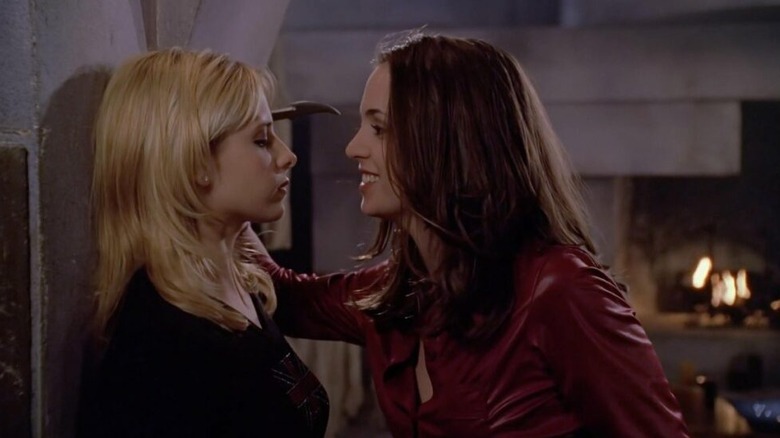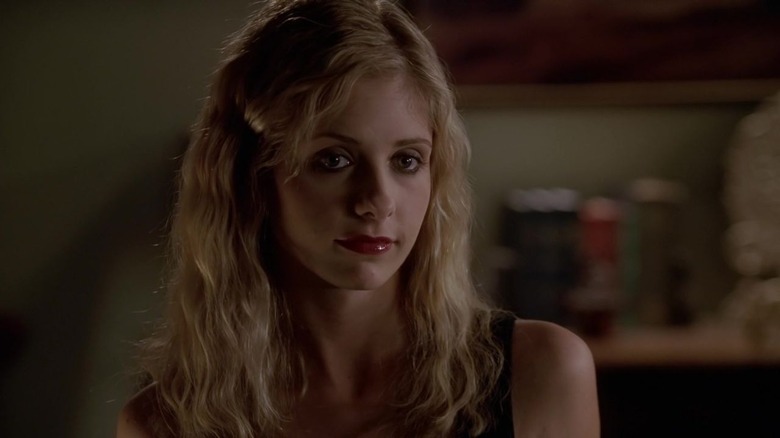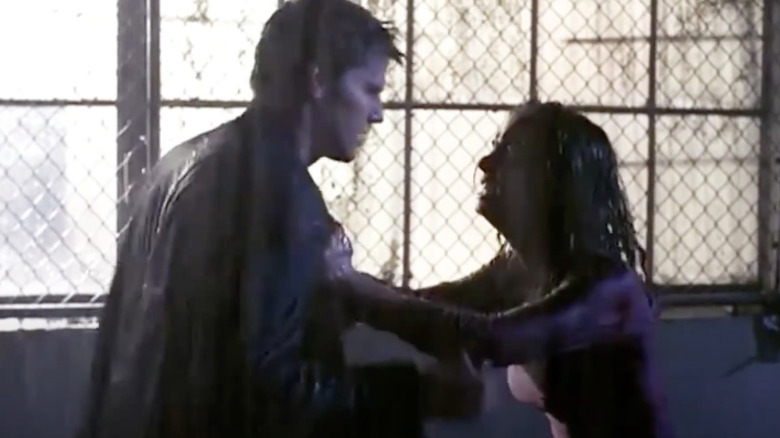How Buffy The Vampire Slayer's Writers Used Faith To Explore Buffy's 'Bloodlust'
Don't let the title fool you: "Buffy the Vampire Slayer" isn't the only one of her kind. The "Slayer" line goes back millennia, and when one falls, another young girl is called on by destiny. In the season 1 finale, "Prophecy Girl," Buffy (Sarah Michelle Gellar) briefly dies but is revived. The writers took advantage of that technicality in season 2 to introduce another slayer, Kendra (Bianca Lawson) — but she met a swift end.
Enter Faith Lehane (no relation to Dennis) in season 3, played by Eliza Dushku and sharing her actress' Boston origins. Her name is a virtue, but Faith is a rebel — so much so, she bounces from ally to enemy and then back again. In an interview with "Buffy" writers and producers, they discussed how, from the beginning, Faith was meant to be a "psycho" Slayer who would be a foil for Buffy. Marti Noxon called her Buffy's "shadow self," while Jane Espenson said:
"Here's a Slayer that makes the wrong choice. And we can actually, through the course of the season, see Buffy flirt with making those same choices, and decide not to."
This flirting mostly happens around the third season's midpoint — episode 14, "Bad Girls," written by Douglas Petrie. The writer said, "There's a little bit of bloodlust in Buffy. There's a lot of bloodlust in Faith. Faith opens the floodgates and goes to places that Buffy only flirts with."
Those floodgates also unleashed consequences that carried on until the end of the show.
Searching for faithful kinship
"Bad Girls" is about Buffy following Faith's lead, who only lives by one rule: "Want, take, have." Dushku described her character as a "working-class Slayer," and it tracks that someone who grew up wanting wouldn't be able to resist selfishly using newfound power. Buffy finds that Faith's approach to slaying gets her adrenaline pumping and the two begin spending more time together, even outside of work. It's important to note this isn't a one-way street either; Faith isn't trying to corrupt or trick Buffy, she just wants a friend, and by letting Buffy in, her personality rubs off on her.
Until a tragic mistake, when Faith kills a human criminal, mistakenly believing he was a vampire. Buffy is shaken, but Faith shrugs it off — the episode ends with Faith declaring, "I don't care [that I killed someone]." The following episode, fittingly titled "Consequences" (written by Noxon), has Faith's Watcher Wesley (Alexis Denisof) throw the book at her ... which only pushes her into the employ of the season's Big Bad, Mayor Richard Wilkins (Harry Groener).
It's important to remember Faith's background: She came from a broken home and she had two Watchers in a row betray her (the first being the villain of the week Gwendolyn Post in "Revelations"). Faith is a Buffy who never had a Giles ... until the Mayor. Mr. Wilkins, who is proof positive you don't need to be a good person to be a nice guy, treats Faith like the daughter he never had. Faith claims she doesn't trust anyone, but if you do win her over, she'll do anything for you. It's just too bad that Faith finally gets some parental affection from an evil place, leading her down a path that ends with her in a coma following a fight with Buffy.
A walk on the straight side
Is Faith really a bad girl, though? Her arc after "Buffy" season 3 is about asking that question. She awakens in the season 4 episode "This Year's Girl" and, with a magical device, swaps bodies with Buffy. The rest of the following episode, "Who Are You?", follows Faith-as-Buffy (Gellar and Dushku both nail each other's cadence and mannerisms).
Watching the episode, one can't shake the feeling that Faith wants to be Buffy. Before the switch, when she takes Buffy's mother Joyce (Kristine Sutherland) hostage, you can tell she's jealous of their mother-daughter relationship. Afterward, Faith-as-Buffy bathes and admires her new legs. Then she rehearses in the mirror, mostly coming back to one line: "You can't do that, it's wrong!" To Faith, Buffy is a moralistic prude — but better that than a murderer.
When Faith does some heroic vampire slaying, it's just to keep up appearances at first, but by the episode's end, she's doing it electively — she'd forgotten that it can feel good to do good. Then Buffy-as-Faith arrives and a fight ensues; Faith, punching her own face, calls herself a "disgusting murderous b****." Faith wants the fresh start of a new body not just to escape legal consequences, but the guilt gnawing at her soul.
Faith's arc carries over into the "Angel" two-parter, "Five by Five" and "Sanctuary." After making it to Los Angeles, Faith goes clubbing and dances to Rob Zombie's "Living Dead Girl," because she's on the path of slow suicide.
Five by Five
"Five By Five" is titled after Faith's catchphrase, basically meaning "everything's good/I'm fine." It's ironically used since in the episode, she absolutely isn't. She takes a job to kill Angel (David Boreanaz), but isn't planning to make it out alive. The episode ends with them fighting in a rainy alley; Faith's bravado cracks not from any punches, but from Angel refusing to hurt her. She breaks down sobbing, begging Angel to kill her.
All the way back to "Bad Girls," Faith has been lying when she said she didn't care about the murder. She saw evil as a sunk cost, though, and believes she might as well be bad since there's no other path for her. Now it's become too much and she wants it to end. Angel, as the vampire with a soul and a body count two centuries wide, can relate.
So "Sanctuary" is about Angel sheltering Faith, even from guest star Buffy, in hopes he can help balance his own cosmic scale by helping with hers. Faith still doesn't trust good intentions, asking Angel why he's being nice to her, but now her name's meaning sincerely comes into play; Angel has faith that she can be better because he has to believe he can be, too. In a Dostoevsky-like conclusion, Faith turns herself in. The ending of "Sanctuary" mirrors "Who Are You?" — both episodes close with a side profile close-up of Faith, but in "Sanctuary," she's now at peace.
When Angel loses his soul in season 4, Faith is called in to help save him, repaying the favor owed while solidifying her redemption. Faith may have started as only Buffy's shadow self, but her circular arc took her on a journey where she grew into more — all without shedding the rebellious edge that made her such an alluring character in the first place.



